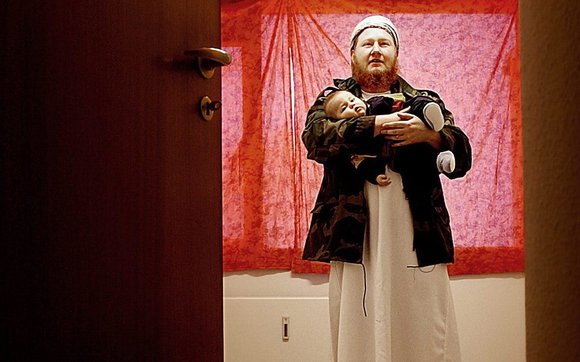 |
Morten Storm, 37, claims he worked for six years as an informant for the CIA, Britain's MI5 and MI6 and Denmark's security service, PET. All declined to comment for this article.
"Could they just say 'he never worked for us'? Sometimes silence is also information," Storm told AP in Copenhagen. "I know this is true, I know what I have done."
Storm's unlikely story, told in a new book and an interview with The Associated Press, has the drama and intrigue of a "Homeland" episode. But the burly, red-bearded Dane insists his tale isn't fiction.
Storm said he decided to reveal his secret-agent life to the media — he first spoke to a Danish newspaper in October — because he felt betrayed by his agent runners.
In particular, he was upset that he wasn't given credit for the airstrike that killed Anwar al-Awlaki, a senior al-Qaida figure, in Yemen in 2011.
Storm claims the CIA won't admit that his work helped them track down the U.S.-born cleric, accused of having inspired the 2009 shootings in Fort Hood, Texas, and the attempted Christmas Day bombing of a jetliner approaching Detroit the same year.
He also claims to have played a role in a series of well-documented anti-terror operations in the past six years by infiltrating extremist mosques in Britain and militant groups in Somalia. He said he often met his handlers in exotic locations and provided a photograph of one such rendezvous with purported PET agents, at a geothermal spa in Iceland.
Another photograph shows a suitcase packed with cash — $250,000 he claims to have received from the CIA for an undercover operation to track down al-Awlaki though that effort ultimately failed.
Bob Ayers, a former U.S. intelligence officer, cast doubt on Storm's claims.
"Just because he claims to have worked for these agencies doesn't mean he was on anyone's payroll, as he almost certainly would not get clearance," said Ayers, who now lives in London. "It is also doubtful that he would have been one of Awlaki's trusted insiders. The only thing less trustworthy than an enemy agent is an enemy agent who has turned."
Storm says he provided information that led to the 2007 arrest in Britain of Hassan Tabbak, a Syrian-born man sentenced to seven years in prison for trying to make bombs in preparation for terrorist attacks.
 |
The most elaborate operation involved al-Awlaki. In 2009, Storm said, the reclusive cleric asked for his help to find a European wife. Storm made contact on Facebook with a Muslim convert from Croatia named Aminah, who was fascinated with al-Awlaki. Storm said he helped carry encrypted video messages between the soon-to-be spouses on a flash drive, before they decided to meet in Yemen. He provided those video clips to AP.
A tracking device was placed in Aminah's suitcase, but the plan failed when she was told to transfer her belongings to a plastic bag upon arrival in Yemen, Storm said.
However, Storm was sent back to Yemen, he said, supplying various items through a courier to al-Awlaki, who still didn't suspect he was being double-crossed. The Dane believes his work eventually helped the CIA pinpoint al-Awlaki's position.
The Americans "had to crawl back to the Danish intelligence to beg them if I would travel back to Yemen and try to recreate or reestablish the contact, the communication with Anwar," Storm said. "Within four weeks, the contact was up again."
Storm, who hails from Korsoer, 75 miles southwest of Copenhagen, has past convictions for bar fights, violence, cigarette smuggling and petty theft stretching back to his early teens. He was a prospective member of the Bandidos bicycle gang before a Muslim jail mate convinced him to convert to Islam in 1997.
He wanted to join Islamist militants fighting in Somalia in 2006 but they rebuffed him. Storm said his anger at that rejection turned to doubts about his religion. Soon he had a complete change of heart, he said, and offered his services to PET agents, who put him in touch with their U.S. and British counterparts.
Storm said his relations with the CIA turned sour after he was told that al-Awlaki was killed in a separate operation. In a meeting at a seaside hotel in Denmark, he secretly recorded a conversation about the issue with a man he claims is a CIA officer.
The man Storm identified as Michael said in a recording given to the AP that the U.S. leadership — even President Barack Obama — were thankful for Storm's efforts, but added that "there were a number of other projects" to track down al-Awlaki. Michael said it was like in a soccer game when several players are in a position to a score.
"The other guy could pass it to you, but he didn't. He took the shot, he scores," Michael said. "That's what happened."
 |
After spilling his secrets, Storm says he believes he's now become a potential target not only for al-Qaida, but the CIA.
"I think that when a person potentially could become a liability, it is what is easiest for intelligence services to get rid of their agents and especially people like me," Storm told AP.
He offered no firm evidence to suggest the CIA, or any other agency, had plans to hurt him.
Storm said he now lives at a secret address in Britain.
"I don't regret anything. All I wanted was to fight terrorism and I ended up being the bad guy," he said. "Everyone has won but me. I am happy I was able to save human lives, but obviously I am paying the price for this now."

No comments:
Post a Comment